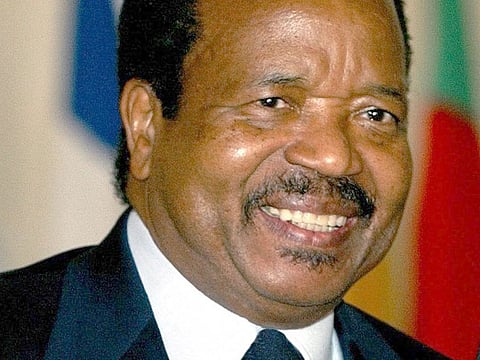The crisis in Cameroon
A series of demonstrations in the country’s English-speaking regions has escalated into violent clashes and shutting off internet services

The English-speaking regions of Cameroon have been gripped by crisis for six months. Thousands of lawyers, teachers and students and several civil society groups have taken to the streets and launched strikes in opposition to discrimination against Anglophones by the central government.
At one protest, more than 100 people were arrested. The crisis escalated in January when activists threatened a month-long strike. The government banned two major organisations, arrested two of the movement’s leaders on terrorism charges and imposed an internet blackout across Anglophone Cameroon. Internet services have not been entirely restored, which has impacted local business and provision of health care. While President Paul Biya has offered concessions, they appear palliative and another protest wave seems imminent.
Here is what you need to know about the protests, and what they might mean for Cameroon and US interests.
n 1. Anglophones had their own state
Before independence in 1960, Cameroon was split between a larger French and smaller British mandate. During decolonisation, a portion of British Cameroon elected to enter into a federation with French Cameroon rather than join Nigeria to its northwest. The new Anglophone state of West Cameroon had its own prime minister, who was also the federation’s vice-president. There were many political parties in both states. The dominant political party was former president Ahmadou Ahidjo’s Cameroonian Union.
Federalism was an uneasy marriage and Ahidjo quickly began a process of centralisation. He managed to convince other parties to join him in forming a supra-party, the Cameroon National Union (CNU). The CNU and its successor — the Cameroon People’s Democratic Movement (CPDM) — have been Cameroon’s dominant party since. Shortly after, federalism was abolished and a new unitary state created. Many of the Anglophone grievances date back to this change.
n 2. Anglophone resentments are about representation
Anglophones have historically seen themselves as the losers from the national distribution of resources. Politics in Cameroon is multiethnic and depends on the government’s ability to control the flow of resources towards specific regions. The ruling coalition has generally balanced north-south divisions within French Cameroon. Under Ahidjo, public investment and senior political appointments tilted towards his northern Fulani co-ethnics, while under his successor, Paul Biya, it was toward his southern Beti co-ethnics.
In the early 1990s, a pro-democracy movement started in Anglophone Cameroon and forced the government to allow elections. Since then, the government has responded with both co-optation and repression. While an Anglophone has filled the position of prime minister since 1992, Anglophone Cameroon is also frequently subject to government repression. Gerrymandering electoral districts has helped eliminate opposition representation from Anglophone areas.
n 3. Anglophone resentments are also about identity
What is often termed the “Anglophone problem” refers to a lack of national integration. Many activists today are protesting in response to having French language and legal standards imposed upon them. Anglophone Cameroonian courts are sometimes run by appointed French-educated judges despite no knowledge of British common law, which is supposed to be in use. Similarly, teachers and students have criticised the lack of opportunities to study or take exams in English.
In recent years, Anglophone resentments have found growing expression in overt secessionist groups like the Ambazonia Movement, or organisations advocating a return to federalism like the Southern Cameroons National Council. This makes a solution to the current crisis more complicated. Many activists now demand that the central government cede a significant degree of autonomy to Anglophone areas.
n 4. The question of who will succeed Biya looms
After almost 35 years in power, Biya is one of Africa’s longest ruling presidents along with Zimbabwean President Robert Mugabe and Angolan President Jos Eduardo dos Santos. But many also see Biya as crucial in holding together the coalitional nature of Cameroonian politics. A new president could challenge the position of several elites who maintain fiefdoms that span a bloated public sector and military.
Insider challenges to Biya’s dominant position have been few. In 2008, Biya controversially abolished term limits so he could continue to run for reelection. Many saw this as a stopgap measure to prevent a succession crisis. There is still no obvious successor expected to run in next year’s presidential election, and some have called for Biya to run again. Some of the current protesters, however, have made it clear that they strongly oppose another Biya term.
n 5. The United States is a key player
The United States appears to prefer the status quo. The State Department’s response to the crisis was to call for restraint and dialogue, without condemning the government’s action. This response reflects the common US foreign policy dilemma of trying to balance straightforward national security interests with promoting democracy.
Cameroon’s status as a US security partner came into focus in 2002, when Cameroon held a temporary seat on the UN. Security Council. The US heavily lobbied Cameroon to abstain on any war resolution vote. Since the rise of Boko Haram in the region, the United States has increased military aid to Cameroon.
In 2009, the then US ambassador to Cameroon, Janet Garvey, wrote, “It is difficult to say that we have substantially moved the ball on the things that matter most to us”. This attitude does not appear likely to change under the current administration.
— Washington Post
Yonatan L Morse is an assistant professor of political science at the University of Connecticut, where he studies and teaches about democracy, authoritarianism and sub-Saharan Africa.
Sign up for the Daily Briefing
Get the latest news and updates straight to your inbox



